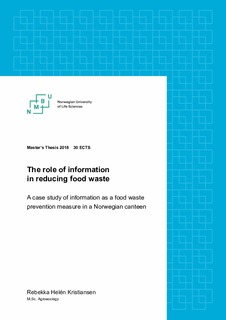The role of information in reducing food waste : a case study of information as a food waste prevention measure in a Norwegian canteen
Master thesis
Permanent lenke
http://hdl.handle.net/11250/2567323Utgivelsesdato
2018Metadata
Vis full innførselSamlinger
- Master's theses (IPV) [240]
Sammendrag
Food waste represents a major problem that must be resolved in order to achieve a sustainable food system. Most of the food waste in industrialised countries are consumer related and occur at the end of the food supply chain. Food waste prevention measures that targets consumers are thus needed. In Norway, a large number of meals are served in the hospitality and food service sector every day. This study conducts an independent assessment of food waste in a canteen to test how differing forms of information communication to guests can be used to reduce food waste. Furthermore, the study identifies benefits associated with reducing food waste in the studied canteen. A combination of participant observation and surveys are used to document the effect of information on canteen guests, whereas food waste quantification is used to document the effect of information on the amount of food waste. The study found that the information campaign results in periodic short-term decreases in the amount of food waste. The use of a variety of information communication approaches combined over time are suggested to further decrease the amount of food waste. The high benefit-cost ratio of the information campaign showsthat the implementation of an information campaign is an efficient investment relative to its costs. In addition to economic and environmental benefits, this study suggests that information campaigns targeting canteen guests may potentially have effects on food waste generation in other parts of the food supply chain. This can provide the basis for further research.

